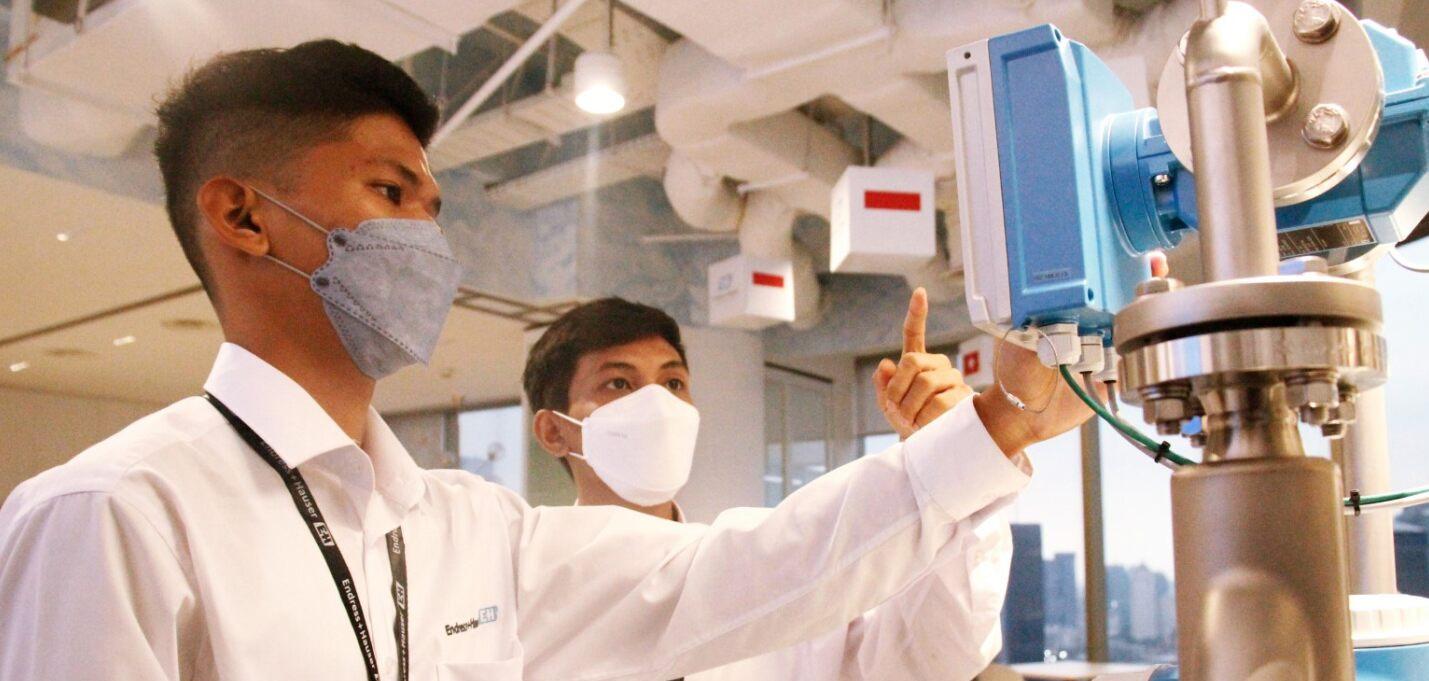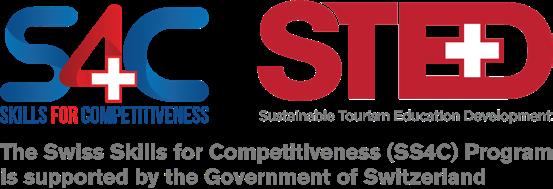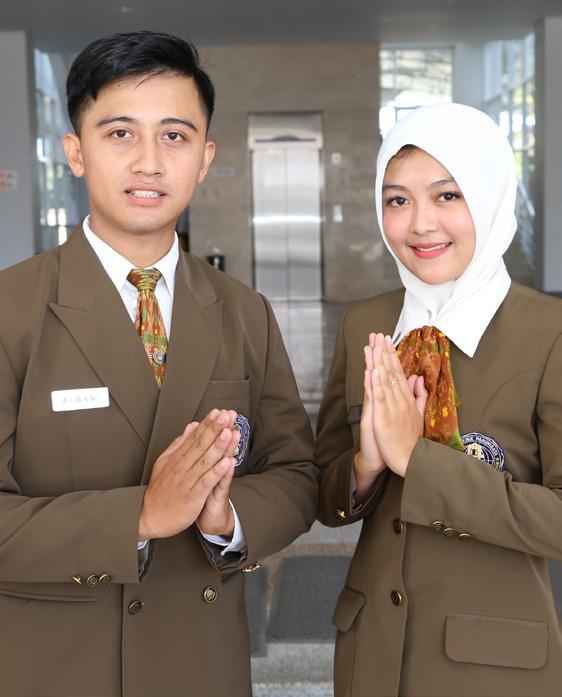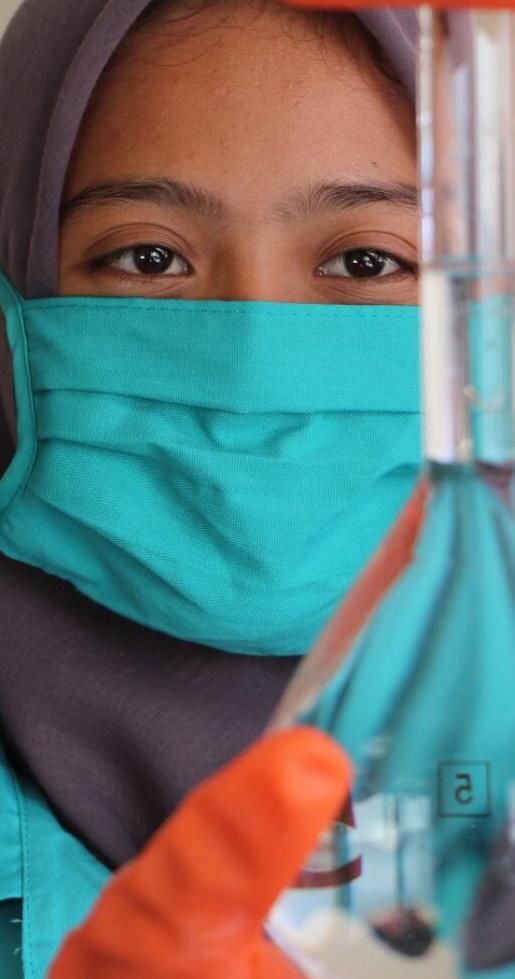Swiss Skills for Competitiveness (SS4C) Program Factsheet
Supported by the Swiss State Secretariat for Economic Affairs

Strengthening Indonesian Private Sector Competitiveness
Indonesia has achieved remarkable social and economic development, being a member of the G20 countries with the fourth-largest population globally and a growing Gross Domestic Product (GDP). Unemployment is low, but youth unemployment and the rates of people not in education, employment, or training (NEET) pose challenges. Indonesia aims to become a high-income country by 2045, following a 20year development plan focusing on human capital and global competitiveness. Challenges persist, including inadequate infrastructure, complex regulations, and skilled labor. The government acknowledges these issues and has launched initiatives like the National Revitalization of Vocational Education and Training to improve skills link-and-match and industry collaboration. To enhance vocational training, Indonesia needs to improve curriculum relevance, teacher qualifications, and industry partnerships.
We believe these challenges can be addressed by adapting elements from the Swiss and German dual vocational education and training system (dVET), which is driven by the industry: Students learn in a combination of theory and praxis, with at least 25% of the total study duration spent in the company for onthe-job training (internship) and with industry-based study programs.
1. Industry-Based Curriculum Development
a. SKKNI (National Competency Standards)
b. Industry input on course design, semester learning plans, modules.
c. STEM (Science, Technology, Engineering, Mathematics)
2. Industry-Based Curriculum Implementation
a. Project based learning (PBL)
b. Competency based training (CBT)
c. Two- learning venues at school and company (at least 6-12 months internship)
d. Ratio of practical vs classroom training (at least 50% : 50%)
3. Competency certification
• Certification schemes
• Competency test materials
• Competency assessors
• Testing centres

2024-2027
Program Duration Government Partners
Ministry of Industry (MoI) Ministry of Tourism and Creative Economy (MoTCE)
Previous Projects
Skills for Competitiveness (S4C) Sustainable Tourism Education Development (STED)
Objective
The competitiveness of the Indonesian private sector, particularly small and medium enterprises (SMEs), is strengthened as the skills of female and male graduates increasingly match industry needs.
1. Lecturers and trainers
Competent management, lecturers, staff
• Company: Qualified In-Company Trainers (In-CT)
2. Industry lecturers
• Recognition of Prior Learning (RPL)
• Upskilling Practical facilities
• Poly: Workshop, lab, Tefa
• Company: On the job training, training corner, industry classes
After the completion of their Phase I (2018-2023), the Skills for Competitiveness (S4C) and Sustainable Tourism Education Development (STED) projects will now synergize expertise and leverage learning in the new Swiss Skills for Competitiveness (SS4C) program.




Target Groups
At the heart of SS4C’s focus are three interconnected target groups: Indonesian private sector companies, individuals seeking decent work and career opportunities within these companies, and public and private stakeholders and service providers who facilitate the matchmaking between the first two groups via high quality dual vocational education and partnerships.

How do we want to achieve this?
If incentives and capacities of public and private dVET Service Providers at micro-level (e.g., Polys, lead companies) and meso-level (e.g., MoI’s Agency for Human Resources Development, MoTCE’s Human Resources Development Centre, sector associations) are strengthened, then graduates’ skills will match industry needs and improve productivity of SMEs which will contribute to more competitive SMEs in Indonesia on the global market, because better services to Polys will be offered to them and the overall skills and competitiveness ecosystem at national and sub-national level is improved.
Therefore, the program focuses on three linked outcomes for improving dVET services in Indonesia:
Outcome 1
Outcome 2
Outcome 3
Enhances public sector dVET provision, involving selected polytechnics and centers of Excellence under SS4C’s partner ministries.
Emphasizes private sector involvement in dVET, engaging sector associations, chambers of commerce, and companies as individual service providers.
Aims to integrate the experiences from Outcome 1 and Outcome 2 into the broader national and sub-national skills ecosystems.
This involves fostering collaboration among public, private, and civil society stakeholders to analyze, plan, and manage local economies and labor markets, with a specific emphasis on skills development. Through these targeted efforts, the program aims to bolster Indonesia’s workforce and increase its competitiveness.
Best Practices – Highlight from Phase 1


S4C: During the first Phase, S4C has trained facilitators to support Industry-based Curriculum (IBC) development. This approach involves engaging multiple industry experts in a panel to conduct occupational analysis, forming the foundation for the curriculum. These facilitators are now pooled under the Agency for Industrial Human Resource Development (BPSDMI). The curricula for 3 study programs at the new Politeknik Industri Petrokimia Banten have been developed and reviewed by using this method, through cooperation with the association INAPLAS and its member companies.
Besides Poly Morowali together with the Indonesia Morowali Industrial Park (IMIP), Polytechnic Banten and 5 INAPLAS member companies are now cooperating on the 3:3 internship model: Students spend 3 semester learning on campus and then 3 semester in a structured internship at the company. Therefore, 50% of the study duration are practical on-the-job training.
STED: In Bali and Lombok, hotel staff responsible for guiding interns from various Tourism Polytechnics have obtained certification as In-Company trainers through a collaboration between STED and the training service provider EduKADIN. This certification ensures that internships within the hospitality industry are well-structured and maintain high standards, consequently increasing the absorption of students into the industry. This proves to be beneficial for both employers and polytechnic graduates.
For companies to engage in dual VET, supporting services are needed: S4C strengthened the Swiss-Indonesia Chamber of Commerce (SwissCham) to set up the Structured Internship Program. Through this, SwissCham members can receive information and a platform to discuss internship and dVET topics, find the right partner school to source interns, and get support to train their staff to become in-company trainers to organize the internship. Since 2024, a dedicated Vocational Program Manager, co-financed by SS4C, is working at SwissCham to expand the service portfolio.
For the latest information about SS4C, please scan the QR Code or visit the link: https://bit.ly/SS4C
Swiss Skills for Competitiveness (SS4C) Program
Swisscontact | Swiss Foundation for Technical Cooperation
AIA Central, 41st floor
Jl. Jend. Sudirman Kav. 48A, Jakarta Selatan 12930, Indonesia
Phone +62 21 2527 600 Swisscontact
